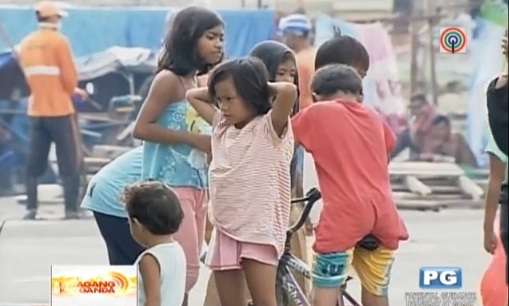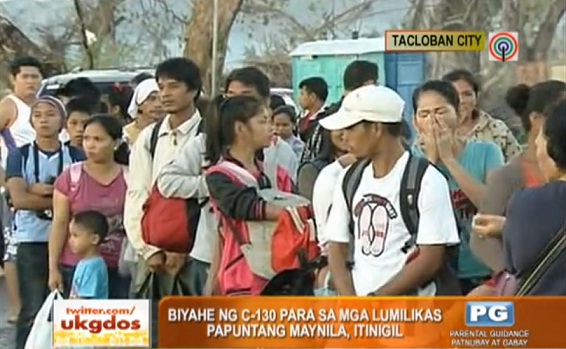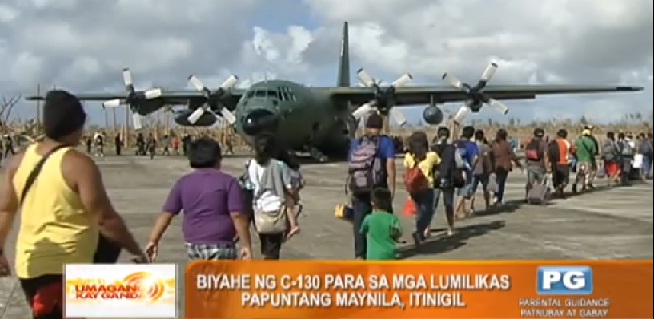Photos from ABS-CBN video

ANC had a report of a human trafficking attempt in Tacloban. DSWD Assistant Secretary Cheche Cabrera related about two cases which they were able to stop. “A very beautiful girl was escorted by two burly looking guys,” she said.
Cabrera said together with the International Organization for Migration and the United Nations, they are setting up a desk in Tacloban Tacloban City, Ormoc and Guiuan, Eastern Samar.“There are lots of possibilities where very young girls will be trafficked,” she said.
DSWD is also coordinating with the Philipine Air Force which is offering free transport through C-130 of refugees to Manila and the Philippine Navy through their ships to be alert in the screening of passengers. Priority is given to the highly vulnerable – those with very young children, pregnant women, persons with disability and seniors. Kapag delikado at hindi makakasagot sa assessment hindi ire-recommend sa C-130, Navy or even the buses,” Cabrera said.
Last weekend, VERA Files conducted a seminar-training for journalists on Human Trafficking in cooperation with the United States Embassy and the Embassy of Canada in Manila.
In his presentation, Ricardo R. Casco, IOM national program coordinator officer and mission coordinator, shared the observation that disastrous calamities, like what happened in Leyte and Samar and much earlier in Bohol and Cebu, heighten vulnerabilities to trafficking.

“Quickly after realization of calamity damage to homes, property, livelihood and infrastructure, victims of both gender and working age including the youth, are likely to migrate internally and internationally as a coping mechanism to and succumb to unverified job offers,” he said.
Another speaker, Lucille Dejito, special counsel for Interventions, International Justice Mission, and Cebu said they observed that in the aftermath of typhoon Sendong that devastated parts Mindanao of December 2011, there was a spike of of requests for birth certificates and application for passports.
Human trafficking is modern-day slavery.
Republic Act 9208 known as the Anti-Trafficking in Persons Act of 2003″ defines human trafficking as “the recruitment, transportation, transfer or harboring, or receipt of persons with or without the victim’s consent or knowledge, within or across national borders by means of threat or use of force, or other forms of coercion, abduction, fraud, deception, abuse of power or of position, taking advantage of the vulnerability of the person, or, the giving or receiving of payments or benefits to achieve the consent of a person having control over another person for the purpose of exploitation which includes at a minimum, the exploitation or the prostitution of others or other forms of sexual exploitation, forced labor or services, slavery, servitude or the removal or sale of organs.”

Casco said human trafficking is the world’s third largest criminal enterprise generating $15 billion last year alone- behind only to international drug and arms trades.
The Philippines is a source country and to a certain extent the destination and transit country for men, women and children subjected to sex trafficking and forced labor.
Casco said a significant number of Filipino men and women who migrate for work abroad are subsequently subjected to conditions of involuntary servitude.
He said findings reveal that 90 percent from the almost 4,000 repatriated OFWs were irregular or undocumented having fake passports and 90 percent of them are potential trafficking victims.
Persons are trafficked for a variety of reasons including debt bondage, forced labor, pornography, prostitution, removal or sale of organs, sex tourism, sex exploitation and others.
An official of the British government, an aide to Justine Greening, Britain’s international development secretary, who is helping to coordinate the UK’s response to the crisis caused by typhoon Yolanda which struck parts of Visayas last Nov. 8, expressed concern “about the safety of women and girls in the Philippines.”
“After previous emergencies in the Philippines, we have seen an increase in violence against women and girls and in particular the trafficking of girls,” the British official said.
The British official recommended sending a women’s ‘protection specialist’.
It is also useful to make the environment not conducive to human traffickers to operate like lighting up the place. But how about in places devastated by Yolanda where power has not been restored?
The British official recommended solar lanterns with built-in mobile phone chargers for remote and vulnerable communities, used in other countries like India which also experienced devastation caused by a cyclone.
Casco said officials and concerned individuals should watch out for indications of increase in the requests for birth certificate and passports without special government-facilitated employment assistance.
Here’s the new order from a pope who will be much loved and remembered by believers he will be leaving behind. Governments and leaders MUST also be inspired by the Pope’s priorities which is timely IF to consider the disasters and catastrophes happening one after the other where the poor suffers most, always used as reasons by government leaders to get “pogi points” but being neglected afterwards.
POPE SPELLS OUT PRIORITIES
TO DRAW IN MORE BELIEVERS
By Nicole Winfield
The Associated Press
VATICAN CITY—Pope Francis denounced the global financial system that excludes the poor as he issued the mission statement for his papacy on Tuesday, saying he wants the Catholic Church to get its hands dirty as it seeks to bring solace and mercy to society’s outcasts.
In a 224-page document, Francis pulled together the priorities he has laid out over eight months of homilies, speeches and interviews, pushing to shift the Church away from a focus on doctrine to one of joyful welcome in a bid to draw in believers in a world marked by secularization and vast income inequalities.
The document, Evangelii Gaudium (The Joy of the Gospel), is the second major teaching document issued by Francis, but is the first actually written by him since the encyclical The Light of Faith, issued in July, was written almost entirely by Pope Benedict XVI before he resigned.
Francis’s concerns are laced throughout, and the theological and historical citations leave no doubt about his own points of reference and priorities: � Popes John XXIII and Paul VI, who presided over the Second Vatican Council, which brought the Church into the modern world, are cited repeatedly.
And in a first for an apostolic exhortation, as this type of papal pronouncement is called, Francis cited various documents of bishops’ conferences from around the world, an indication of the importance he places in giving the local Church greater say in Church governance. In the text, Francis denounced trickle-down economic theories as unproven and naive, saying they are based on a survival-of-the-fittest mentality “where the powerful feed upon the powerless” with no regard for ethics, the environment or even God.
“Money must serve, not rule!” he said in calling for political leaders to reform the system. “The Pope loves everyone, rich and poor alike, but he is obliged in the name of Christ to remind all that the rich must help, respect and promote the poor.”
In a direct challenge to the focus of the past two popes, he also decried the Church’s “obsession” with rules and doctrine and said that in some cases, the Church’s old customs can be cast aside if they no longer serve to communicate the faith.
In the Church’s “hierarchy of truths,” mercy is paramount, proportion is necessary, and what counts is inviting the faithful in, he said.
At the same time, Francis restated the Church’s opposition to abortion, making clear that the doctrine is nonnegotiable and is at the core of the Church’s insistence on the dignity of every human being.
The aim of the text was to set out his idea of what the Catholic Church should be, and how its priests, bishops and even the pope must change course to fulfill the task. “I prefer a Church which is bruised, hurting and dirty because it has been out on the streets, rather than a Church that is unhealthy from being confined and from clinging to its own security,” he wrote. “I do not want a Church concerned with being at the center and then ends up by being caught up in a web of obsessions and procedures.”
He added: “More than by fear of going astray, my hope is that we will be moved by the fear of remaining shut up within structures which give us a false sense of security, within rules which make us harsh judges, within habits which make us feel safe, while at our door people are starving and Jesus does not tire of saying to us, ‘Give them something to eat.’”
In the frank and often funny style that has come to define Francis’s preaching, the Argentine Jesuit chastised priests for their complacency, giving them a lesson on preparing homilies that don’t put the faithful to sleep. He reminded them that confession shouldn’t be “torture,” and told them to get out of their sacristies, get their shoes muddy, get involved in the lives of their faithful and not be defeatist “sourpusses.”
While again ruling out women’s ordination, Francis called for greater role for women in making decisions in the Church and said the faithful ought not to think that just because priests preside over Mass that they are more important than the people who make up the Church itself.
“The Church, as the agent of evangelization, is more than an organic hierarchical institution; she is first and foremost a people advancing on its pilgrim way towards God,” he wrote.
Francis cited Vatican II documents calling for a more decentralized Church authority and said he, too, must rethink the papacy to achieve the goals of spreading the faith. He noted that Pope John Paul II had asked for proposals to rethink the way the primacy of the pope is exercised, a delicate and potentially revolutionary issue that hasn’t yet been resolved.
Francis is currently overseeing a major overhaul of the Vatican’s dysfunctional administration, but he said that he was “open to suggestions” about how to change the very nature of the papacy and its relation to the world’s bishops conferences, to make the papacy reflect better what Jesus intended and what the Church needs today.
“Excessive centralization, rather than proving helpful, complicates the Church’s life and her missionary outreach,” he said
Source:� Business Mirror, A2 Thursday, November 28, 2013
� news@businessmirror.com.ph
OFW nagsoli ng cash, iPhone
http://www.abante.com.ph/issue/dec0113/abroad02.htm
Ang dami talagang masamang tao dito sa mundo. Biktima na nga sila ng bagyo, biktimahin ulit sila. Don’t these human traffickers have conscience?